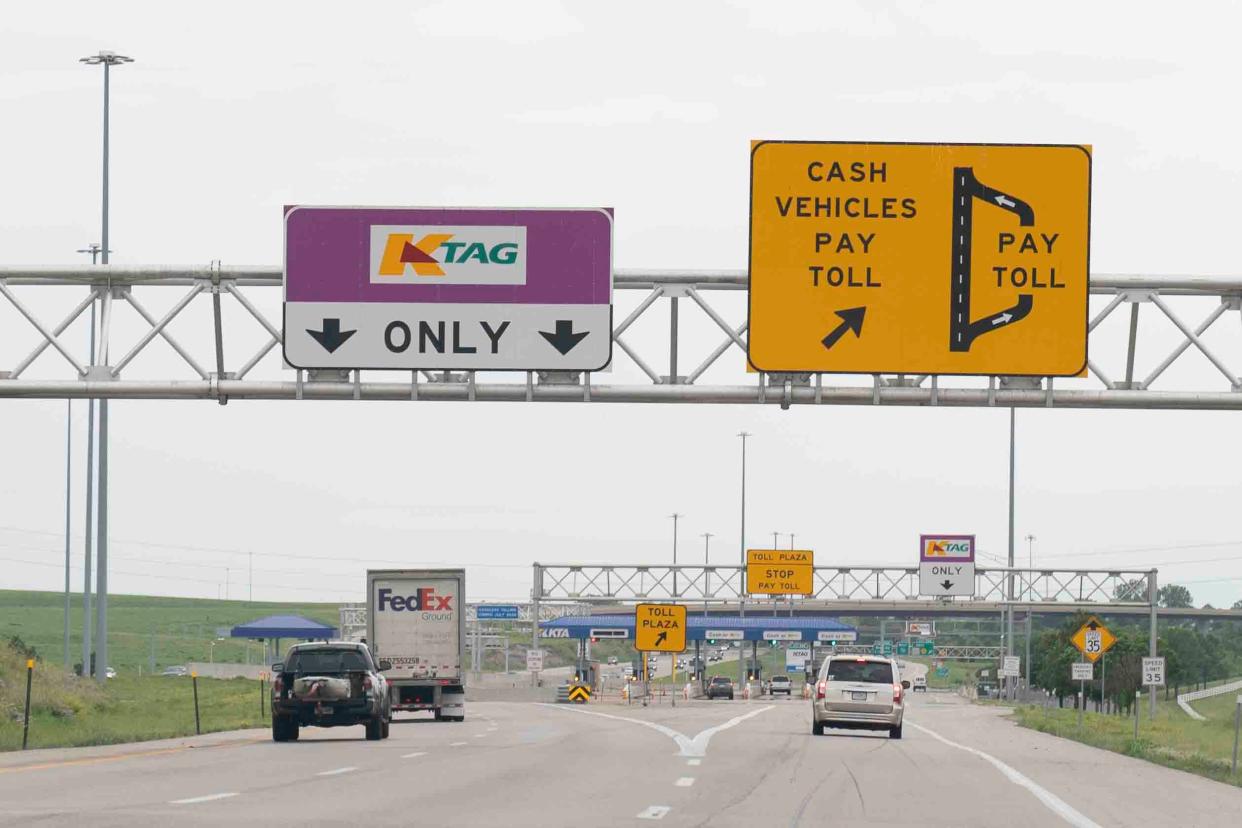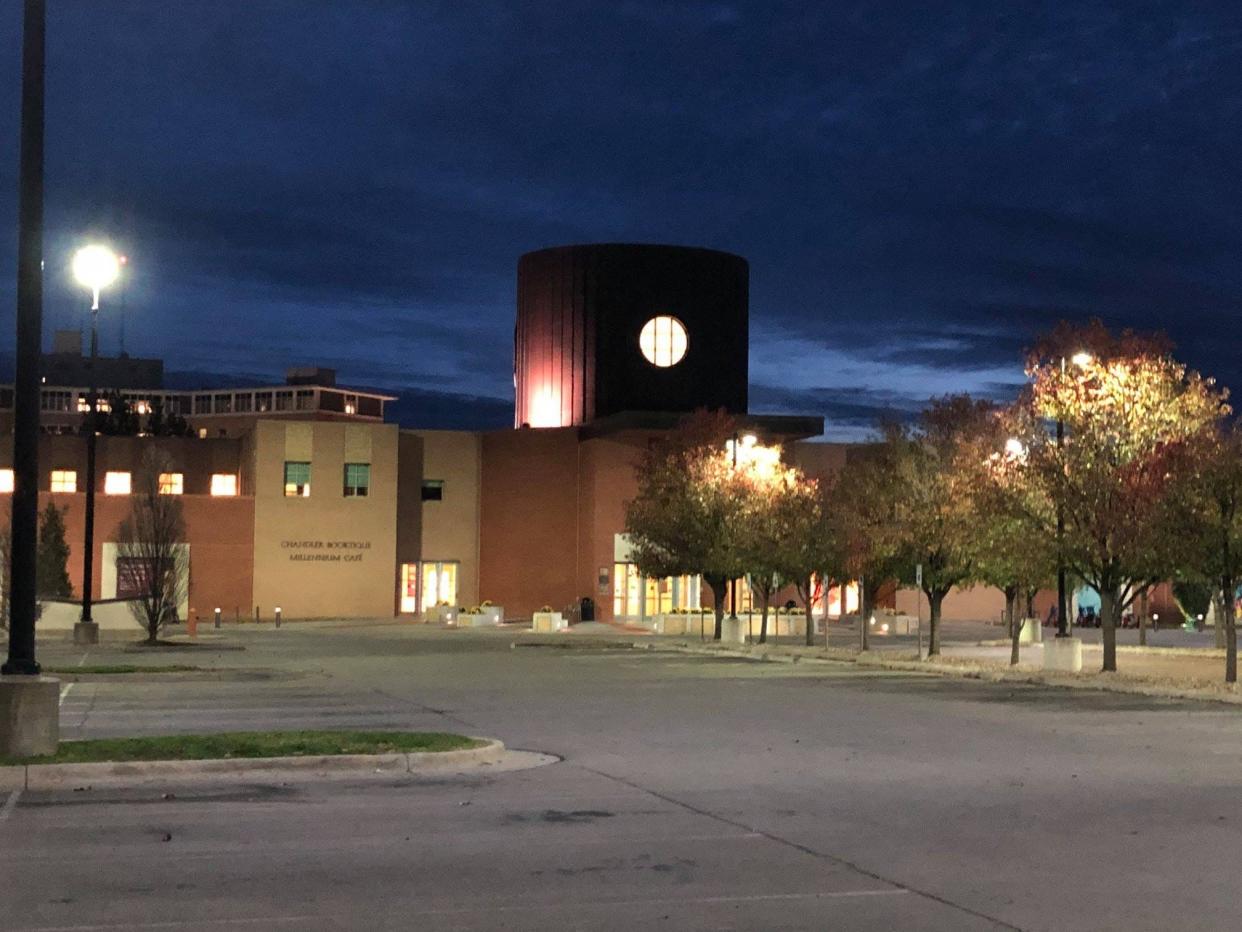With cashless tolling coming soon, you can get a free K-TAG sticker at these Topeka events
With the Kansas Turnpike about to implement cashless tolling, a rising number of vehicle owners are getting K-TAGs to save money.
The Kansas Turnpike Authority distributed more than 19,000 K-TAGs to motorists at their request over the first 15 days of June, compared to slightly more than half of that over the same time period last year, said Rachel Bell, the KTA's director of business services and customer relations.
"We have seen a steady increase in transponder orders over the past couple of years," Bell said. "But the last several months have been very busy and June has our team working hard to send out K-TAGs."
Overall, nearly 1.2 million K-TAGs are active, she said.

How much will K-TAG owners save when cashless tolling takes effect?
The rise in K-TAG orders comes as the KTA prepares to implement cashless tolling at 11:59 p.m. June 30 for drivers who use the turnpike, a 236-mile toll road between Kansas City, Kansas, and the Kansas/Oklahoma state line.
Turnpike customers using K-TAGs currently save up to 35% on tolls compared to what other users are charged, Bell said.
"Once cashless tolling begins, K-TAG customers will save 50% compared to those identified by their license plates," she said.
Drivers using compatible transponders from other states will pay the same rates as K-TAG customers, Bell said.
How can I get a K-TAG?
K-TAG stickers, which can be attached to the inside of a vehicle's windshield, are free. Bumper-mounted external K-TAGs cost $25 each. K-TAGs may be ordered online at myktag.com.
The KTA is distributing K-TAGs at dozens of pop-up events it is holding in June, July and August at cities along the turnpike route. A list can be found on the KTA's Facebook site at https://www.facebook.com/KansasTurnpike/events.
That site says free K-TAG stickers will be handed out this week in Topeka beginning at 9 a.m. Tuesday at Equity Bank, 701 S. Kansas Ave.; 3 p.m. Tuesday at Equity Bank, 3825 S.W. 29th; 12:30 p.m. Wednesday at the Topeka & Shawnee County Public Library, 1515 S.W. 10th Ave.; and 6 p.m. Thursday at Evergy Plaza, 630 S. Kansas Ave.

Dillons stores offer BancPass, which is powered by K-TAG, Bell said.
"This is a cash-based transponder option and allows customers to reload their transponder using cash at Dillons stores," she said.
Customers can learn more about that option at www.bancpass.com, she said.
What will happen when cashless tolling takes effect?
Once cashless tolling begins, the roughly 70% of Turnpike users with K-TAGs or similar devices from other states will continue using their credit card or bank account to pay a monthly bill to cover tolls incurred.
Compatibility agreements the KTA has in place with other states and third-party providers enable it to read 22.4 million transponders in addition to K-TAGs, Bell said.
Drivers without K-TAGs or other transponders currently need to pick up a ticket when they enter the turnpike or pay by cash or card at a toll booth when they leave it.
Under the new setup, they won't need to do that any more. All drivers will keep moving when they enter and leave the turnpike.
The KTA's new toll payment system, DriveKS, will use an electronic transponder to identify vehicles by their K-TAG or license plate, Bell said.
If a vehicle has no cashless tolling device, DriveKS will use license plate registration information to identify the owner's home address and send that person a bill, unless he or she has already arranged to pay, she said.
How is the KTA getting the word out?
The KTA has used several tools to get the word out about cashless tolling, including holding pop-up events, sharing information with journalists and making community presentations, Bell said.
The KTA has gotten help with that from the state tourism office, chambers of commerce and municipal governments in cities along the turnpike and community organizations, including Rotary and Lions clubs, she said.
"We are so appreciative that much attention has been given to this historic change," Bell said.
The KTA has also partnered with the Kansas Department of Revenue to include cashless tolling information in all vehicle registration mailings this year, she said.
"We want all drivers to understand and be prepared for this change," Bell said. "However, 37 million trips were taken on the Kansas Turnpike last year and we know we won't reach everyone."
Contact Tim Hrenchir at threnchir@gannett.com or 785-213-5934.
This article originally appeared on Topeka Capital-Journal: Kansas Turnpike Authority distributing an increasing number of KTAGs
